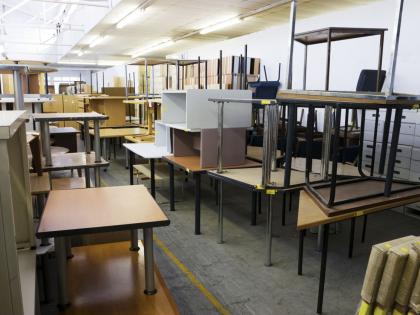Disposal Methods
The Surplus Property Division redistributes state assets to other entities that can use them. This saves taxpayer dollars because entities don’t have to buy new assets.
Agencies are encouraged to work with other state agencies, local governments, and nonprofit organizations in their communities so that redistribution benefits everyone.
When you enter a transaction request in AssetWorks, you must select a disposal method. Choose the method based on your best determination. This will serve as a recommendation to the Surplus Property Division. Ultimately, the Surplus Property Division will decide how to best dispose of the property. Methods include:
Direct Negotiated Sales are used for redistribution from a state entity directly to an eligible local government or nonprofit. Learn more.
Before selling to the public, the Surplus Property Division offers the items to eligible donees (recipients) for 5 business days. Sales to the public happen when something has not been redistributed or destroyed. These sales are normally offered via the internet. There are two ways to do this: auction sale or fixed price.
Internet auctions are the preferred method for selling property to the public because they reach a wide audience, are fast, efficient, and can reach niche markets. More information about internet auctions, including procedures and best practices, can be found in the Georgia Surplus Property Manual Chapter 11.
Retail or fixed price sales are a great way to get rid of small items like office furniture or office supplies, not including electronics such as cell phones, laptops, tablets, storage devices, etc. To qualify for this type of sale, the original acquisition value must be less than $5,000 with an expected return of less than $50. More information about retail or fixed price sales, including procedures and best practices, can be found in the Georgia Surplus Property Manual Chapter 11.4.
There are two main types of transfers: intra-agency transfers and inter-agency transfers.
Intra-agency transfers are between internal business units of the same entity. For example, if the Georgia Department of Corrections (GDC) moves property between facilities, the property remains within GDC. The Surplus division does not handle these, and they do not require DOAS approval.
Inter-agency transfers occur when property is moved between state agencies or entities. Since the property is owned by the state, inter-agency transfers are conducted at no cost to either entity.
More information about transfers, including procedures and best practices, can be found in the Georgia Surplus Property Manual Chapter 10.1.
A Vendor Return/Trade-in occurs when state agencies trade in material in exchange for some concession when acquiring new, like property. Vendor return transactions must be submitted to and authorized by the Surplus Property Division. Learn more.
Destruction of property is often the best way to get rid of damaged property, especially when repairing it is not realistic or would cost more than the fair market value.
You must request approval in AssetWorks, receive authorization from the Surplus Property Division, and get an Affidavit of Disposal before you destroy any property. The affidavit lets you choose different ways to get rid of the property besides destruction. More information about authorized disposal, including procedures and best practices, can be found in the Georgia Surplus Property Manual Chapter 12. The Affidavit of Disposal form can be found in Appendix A.
Disposal of Electronics Scrap is the best way to dispose of your office machines when the hard drives have not been removed. You must submit your request in AssetWorks with no more than 7 lines. You need authorization from the Surplus Property Division before giving any assets to a vendor. Do not store electronics outside under any circumstances. Learn more
Related resources
